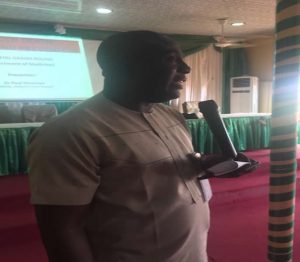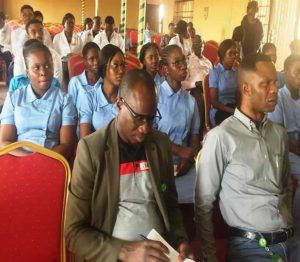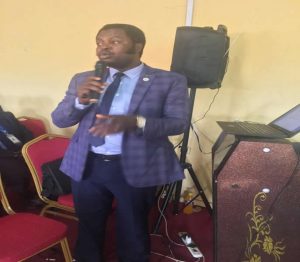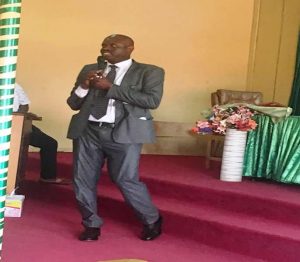 |
 |
 |
 |
Education Committee of Federal Teaching Hospital, Ido-Ekiti (FETHI), under the leadership of Dr Awoyinka, had collaborated with medical experts from departments of Medicine and Anaesthesia of the hospital to organise a seminar to enlighten people about risk factors to Sudden Death and Basic Life Support (BLS) rudiments on Tuesday.
The program is aimed to raise awareness of the causes of sudden death, how to prevent it and also general ways to help save a life when the need arises.
The Chief Medical Director of the hospital, Prof. Adekunle Ajayi, whose declaration and remarks were said by the Chairman, Medical Advisory Committee, Dr Idowu Adebara, welcomed all the medical personnel and other participating members of staff to the session.
The theme for the 2020 was “Sudden Death; Causes and Prevention and Basic Life Support; Cardio Pulmonary Resuscitation”. Various informative presentations and demonstration were made by trio of Dr. Paul Olowoyo, Dr. J.O Odesanya, Dr. T.F Kolawole and Dr. O.E Ariyo
Dr. Olowoyo, who took the first leg in the presentations, began by identifying that Death is the topic that is relevant to us all, yet it simply isn’t pleasant to talk about. He further discussed extensively on the five common causes of sudden death that everyone needs to know, pulmonary embolism, the silent killers, attitudinal change, prevention and take home points.
He informed participants that the role of FETHI in creating more awareness includes sensitisation/health education, through Television program on EKTV and NTA, community outreaches, various out stations, transportation for stroke patients for neuroimaging at no cost to the patient, hence every year as you are planning to mark your birthday go for a general medical check up and get tested to know your status.
In his own presentation titled “Basic Life Support;Cardio Pulmonary Resuscitation, Dr. Odesanya, said BLS entails airway, breathing and circulation without the use of equipment other than protective devise and the use of automated external defibrillation (AED).
Early attempt at resuscitating a victim of cardiac is extremely important to the survival of the victim. He concentrated his discourse on Cardio Pulmonary Resuscitation, and Automated External Defibrillator among others.
Furthermore, he recommended that public access AED programmes should be actively implemented in public places that have a high density of citizens, such as airports, railway stations, bus stops, churches, mosques, offices, shopping malls and casinos.
Dr. Ariyo and Dr. Kolawole, who closed the presentation session, dwelled much on the prevalent epidemic deadly disease “Coronavirus (Covid-19)”. He explains Coronaviruses are zoonotic, meaning they are transmitted between animals and people, adding that common signs of infection include respiratory symptoms, fever, cough, shortness of breath and breathing difficulties. In more severe cases, infection can cause pneumonia, severe acute respiratory syndrome, kidney failure and even death.
Be that as it may, standard recommendations to prevent infection spread includes regular hand washing, covering mouth and nose when coughing and sneezing. Also, avoid close contact with anyone showing symptoms of respiratory illness such as coughing and sneezing.
After entertaining several comments, questions and answers which were appropriately addressed by the presenter, the CMAC, appreciated organizers of the program as well as participants. He therefore urged everyone often make use of hand sanitisers that has at least 70% alcohol ingredient and regularly wash their hands with soap and water. He also commended the efforts of the Federal Road Safety Corp members (FRSC) in always making themselves readily available to respond to road accidents scenes.
In his closing remarks, Dr Awoyinka appreciated the management, resource persons, the hospital partners in progress and the participating audience for their productive contributions. He said the management had put up the programme to sensitise the people.


